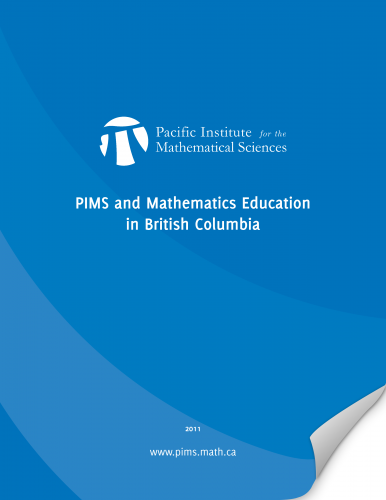PIMS and Mathematics Education in British Columbia
PIMS and Mathematics Education in British Columbia
By Malgorzata Dubiel
 PIMS is interested in K-12 mathematical education because it impacts the culture and appreciation of science in our society and moulds the students who will enrol in postsecondary education.
PIMS is interested in K-12 mathematical education because it impacts the culture and appreciation of science in our society and moulds the students who will enrol in postsecondary education.
Research and anecdotal evidence confirm that the majority of children develop (or lose) their interest in math and science by the time they finish grade five. Therefore, to improve math and science literacy and to have more students prepared for math, science and technology careers, we must focus on our elementary, middle and high schools.
The Fields Institute for the Mathematical Sciences has been involved in high school curriculum issues in Ontario since 1997. It is unfortunate that the BC Ministry of Education is not interested in similar cooperation with PIMS.
Consultations with postsecondary institutions have not meaningfully involved mathematicians in discussions about, or design of, curriculum. Mathematicians - possibly through PIMS - need to be involved in a curriculum design in a more fundamental way, and for all grades from K to 12.
Many problems with the curriculum arise not from content, but from the way curriculum documents are written. In some instances the language is not mathematically correct. More seriously, it focuses on skills and fails to provide a sense that there are important ideas in mathematics. Poorly written curriculum documents can (and do) lead to serious problems in textbooks. It should be noted that mathematicians have not been involved in writing or reviewing the textbooks.
The only way to correct many of the problems is first, to acknowledge that the problem exists, and second, to include mathematicians as partners in discussions on curriculum, textbooks, and education of teachers.
The above article summarizes the report, PIMS and Mathematics Education in British Columbia – prepared by Malgorzata Dubiel (PIMS-SFU) – which was submitted to the BC Ministry of Education to address the shortcomings of the K-12 school system in BC.
Dr Malgorzata Dubiel is a senior lecturer in the SFU Department of Mathematics and PIMS education coordinator. She has earned many awards for her dedication to teaching and mathematics including the 2011 CMS Adrian Pouliot Award, 2011 YMCA Women of Distinction Award in the Education, Training & Development category, the 3M National Teaching Fellowship, the 2005 PIMS Education Prize and the 2003 SFU Excellence in Teaching Award.
The full report is available upon request. Contact reception@pims.math.ca
The Vancouver Sun interviewed Dubiel for a story on this topic, which can be found here: http://ow.ly/aDK3m
By Malgorzata Dubiel
 PIMS is interested in K-12 mathematical education because it impacts the culture and appreciation of science in our society and moulds the students who will enrol in postsecondary education.
PIMS is interested in K-12 mathematical education because it impacts the culture and appreciation of science in our society and moulds the students who will enrol in postsecondary education.Research and anecdotal evidence confirm that the majority of children develop (or lose) their interest in math and science by the time they finish grade five. Therefore, to improve math and science literacy and to have more students prepared for math, science and technology careers, we must focus on our elementary, middle and high schools.
The Fields Institute for the Mathematical Sciences has been involved in high school curriculum issues in Ontario since 1997. It is unfortunate that the BC Ministry of Education is not interested in similar cooperation with PIMS.
Consultations with postsecondary institutions have not meaningfully involved mathematicians in discussions about, or design of, curriculum. Mathematicians - possibly through PIMS - need to be involved in a curriculum design in a more fundamental way, and for all grades from K to 12.
Many problems with the curriculum arise not from content, but from the way curriculum documents are written. In some instances the language is not mathematically correct. More seriously, it focuses on skills and fails to provide a sense that there are important ideas in mathematics. Poorly written curriculum documents can (and do) lead to serious problems in textbooks. It should be noted that mathematicians have not been involved in writing or reviewing the textbooks.
The only way to correct many of the problems is first, to acknowledge that the problem exists, and second, to include mathematicians as partners in discussions on curriculum, textbooks, and education of teachers.
The above article summarizes the report, PIMS and Mathematics Education in British Columbia – prepared by Malgorzata Dubiel (PIMS-SFU) – which was submitted to the BC Ministry of Education to address the shortcomings of the K-12 school system in BC.
Dr Malgorzata Dubiel is a senior lecturer in the SFU Department of Mathematics and PIMS education coordinator. She has earned many awards for her dedication to teaching and mathematics including the 2011 CMS Adrian Pouliot Award, 2011 YMCA Women of Distinction Award in the Education, Training & Development category, the 3M National Teaching Fellowship, the 2005 PIMS Education Prize and the 2003 SFU Excellence in Teaching Award.
The full report is available upon request. Contact reception@pims.math.ca
The Vancouver Sun interviewed Dubiel for a story on this topic, which can be found here: http://ow.ly/aDK3m